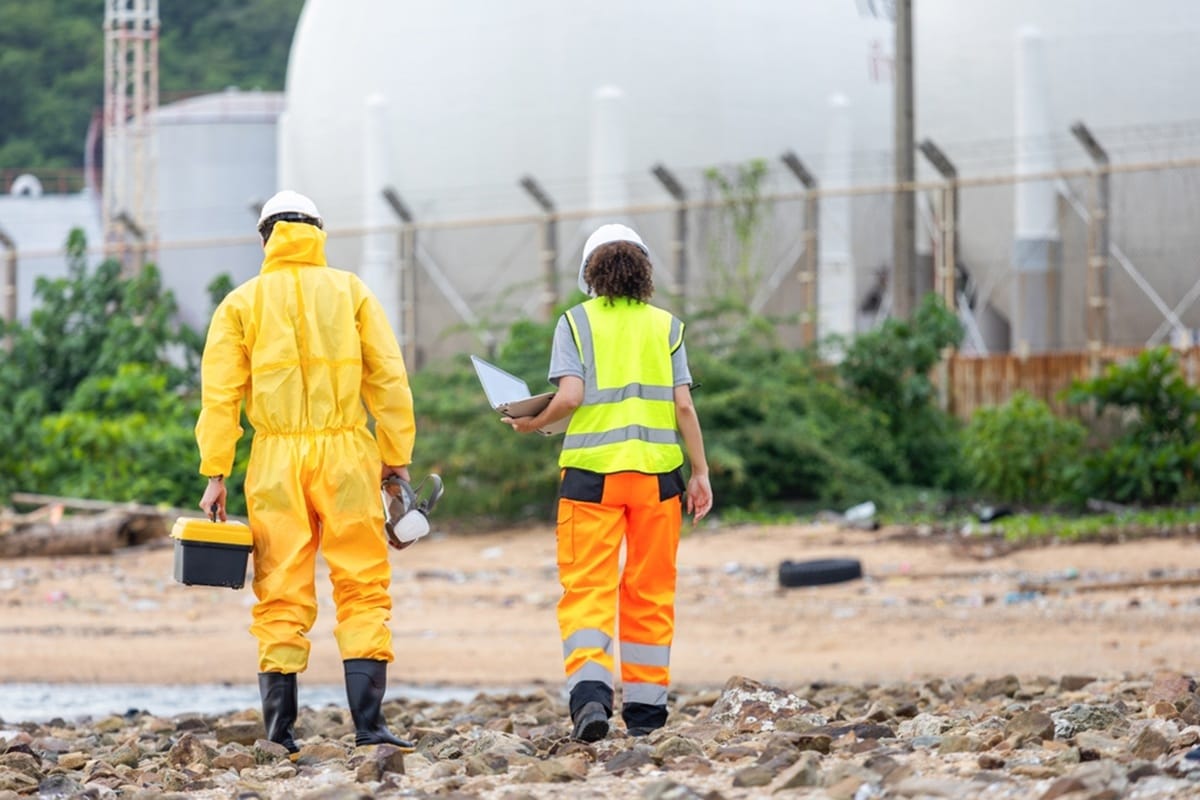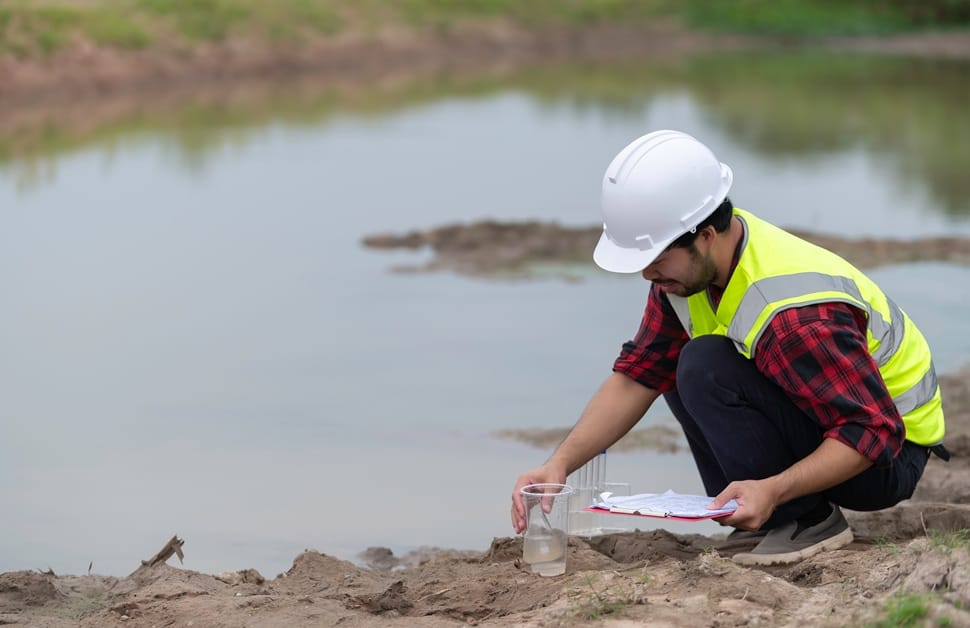Contaminated land in Nottingham: Rapid Assessment Reports
If you’re thinking of buying or developing land in Nottingham, it’s essential to consider the potential for contaminated land, especially in areas with an industrial past. Contamination can pose risks public health, buildings, and the environment, and it’s something Nottingham City Council takes seriously. Fortunately, with the right information and expert support, navigating the process can be straightforward.
Here’s an explanation of what contaminated land is, why it matters in Nottingham, and how the council manages it through the planning system.

Contaminated Land Explained
Contaminated land is ground containing substances such as chemicals, oils, metals or gases that could be harmful to human health, designated ecosystems and controlled waters. Potential contamination can result from historic industrial use, waste disposal, fuel leaks, or even wartime activity.
Under UK legislation, the key definition comes from Part IIA of the Environmental Protection Act 1990, which states that land is contaminated if significant harm is being caused or is likely to be caused, or if pollution of controlled waters is occurring. The Environment Agency’s Land Contamination Risk Management (LCRM) guidance outlines how contaminated land should be assessed and managed.
Why Contaminated Land Is a Problem
Contaminated land can cause a range of serious issues, including:
- Health risks for people living or working on or near the land
- Damage to buildings and infrastructure, especially from soil gases like methane
- Water pollution, affecting local rivers, controlled waters and designated ecosystems
- Delays to planning applications and added costs for remediation
- Decreased land value and difficulties securing finance or insurance
That’s why it’s crucial to assess potential land contamination risks early in the development process and carry out appropriate contaminated land management. This may involve voluntary remediation work to satisfy local authorities that it’s safe.

Nottingham’s Industrial Heritage and Land Contamination
Like many cities in the Midlands, Nottingham has a varied industrial past. Over the years, the city has hosted a wide range of industries, including:
- Textile manufacturing and dye works
- Gasworks and coal yards
- Engineering and metalworking sites
- Chemical factories
- Old landfill and waste disposal sites
Many of these activities took place before modern environmental regulations existed. As a result, old industrial land and brownfield sites around Nottingham may still have pollutants like hydrocarbons, heavy metals, solvents, and asbestos present in the ground today.
Some parts of the city, particularly former industrial hubs along the River Leen, areas near Nottingham Canal, and older factory zones like Radford or Basford, are more likely to be affected by contaminated land.

Nottingham City Council’s Policy on Contaminated Land
Along with all local authorities, Nottingham City Council is responsible for contaminated land management within its boundaries. It maintains a public register of contaminated sites and follows its own Contaminated Land Inspection Strategy, which works alongside national legislation to manage unacceptable risks.
The council’s key concerns are:
- Protecting human health and the environment
- Preventing pollution of controlled waters and groundwater
- Promoting safe and sustainable development
- Encouraging the reuse of brownfield sites over greenfield land
If contamination is discovered, the council has powers to require landowners or developers to investigate and, if necessary, remediate the site if it is found to pose unacceptable risks.
Contaminated Land and the Planning Process in Nottingham
As the local planning authority, Nottingham City Council ensures that all land proposed for development is suitable for its intended use. If you intend to make planning applications for a site with a history of industrial use, or is listed as potentially contaminated, the council will likely require a phased risk assessment.
This normally includes:
Phase 1: Preliminary Risk Assessment (Desk Study)
This involves reviewing historical land use records, maps, environmental data, and a site walkover to identify potential land contamination.
Phase 2: Site Investigation
If the desk study suggests a risk, ground samples are taken for analysis to determine the type and extent of contamination. Consultants may dig trial pits to test for soil contamination, test for ground gas or use a conceptual site model to help their investigations.
Remediation Strategy
Where necessary, a contaminated land management plan is created to safely remediate contamination risks. Strategy details will include information on the clean-up process.
Verification/Validation Report
After any clean-up, a final report is submitted to the local planning authority to show that the site is now safe for development and any risk of further land contamination has been eliminated.

Reusing Contaminated Land for Sustainable Growth in Nottingham
One of Nottingham City Council’s key priorities is to make the most of brownfield land, especially given the city’s limited space for expansion. By remediating and reusing former industrial land, Nottingham can grow sustainably without encroaching on special sites such as greenfield areas or the green belt.
There are already great examples of this in action. Developments like Nottingham Science Park and regeneration projects around The Island Quarter demonstrate how former industrial sites can be transformed into modern, mixed-use developments that benefit the wider community.
What To Do If You Want to Develop Contaminated Land in Nottingham
If your site has a past industrial use, or you’re unsure about its history, your first step should be to consult with a contaminated land consultant. They’ll guide you through the necessary survey process and help meet the contaminated land requirements set by Nottingham City Council.
Trying to shortcut this process can result in planning delays or worse – unforeseen costs if contamination is discovered mid-project, or even regulatory action being taken.
The Role of a Contaminated Land Consultant
A specialist contaminated land consultant will:
- Carry out a Phase 1 contaminated land desk study
- Oversee any site investigations needed
- Prepare and submit a remediation strategy
- Supervise the clean-up (if required)
- Provide a final validation report to satisfy local authorities
Having an experienced consultant on board ensures your development can proceed smoothly and safely, avoiding the risk of regulatory action being taken down the line.

Contact a Contaminated Land Consultant
Land contamination is a key issue in Nottingham due to its industrial history. But with the right approach, and support from professionals, it doesn’t need to be a barrier to development. Nottingham City Council has clear policies in place to manage unacceptable risks and is supportive of redevelopment that brings unused land back to life while protecting special sites and designated ecosystems around the city.
So, if you’re planning to build in Nottingham and think your site may be affected by past land use, be proactive and speak to a contaminated land expert: our specialist contaminated land consultants operate in Nottingham and around the UK. They can provide the reports you need, from preliminary risk assessments to remediation and validation.
For a free quote, complete our contact form or get in touch by email or telephone. If you decide to accept our quote, we will arrange a site visit appointment at a time to suit you.